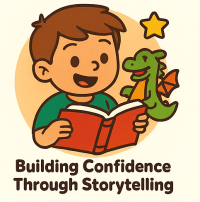Building Confidence Through Storytelling

Storytelling isn’t just a bedtime tradition — it’s a powerful tool that nurtures a child’s confidence and imagination. From a young age, encouraging children to tell their own stories helps them develop essential communication skills and self-expression.
When children are given the opportunity to share their thoughts, ideas, and experiences through storytelling, they learn that their voice matters. This affirmation builds self-esteem and a sense of identity. A child who can say, "Let me tell you what happened," is also learning to structure ideas, convey emotions, and connect with listeners.
Confidence is often born from practice, and storytelling provides a safe environment to practice speaking in front of others. Whether it’s talking to family at the dinner table, presenting a tale in class, or performing a puppet show, these moments of expression build public speaking skills over time.
Beyond speaking, storytelling supports emotional development. By narrating personal experiences or fictional tales, children explore feelings like bravery, kindness, or fear in a constructive way. It helps them process their emotions and understand others’ perspectives — an important foundation for empathy.
Storytelling also fuels creativity. Kids become the authors, directors, and characters of their own narratives. This level of imaginative play promotes critical thinking and innovation. They ask, "What happens next?" and learn that they are in control of the story — and by extension, their own growth.
Parents and educators can foster storytelling by asking open-ended questions like, "What would you do if you found a treasure map?" or "Tell me a story about a flying cat." Providing props like puppets, costumes, or simple drawing tools can inspire even the shyest child to invent.
In classrooms, storytelling circles encourage participation and inclusion. Every child gets a turn, and every story is valued. This not only improves speaking and listening skills but also cultivates a sense of belonging.
Ultimately, when children are trusted with the power of storytelling, they gain more than just words — they gain courage, creativity, and the confidence to speak up and stand out.
